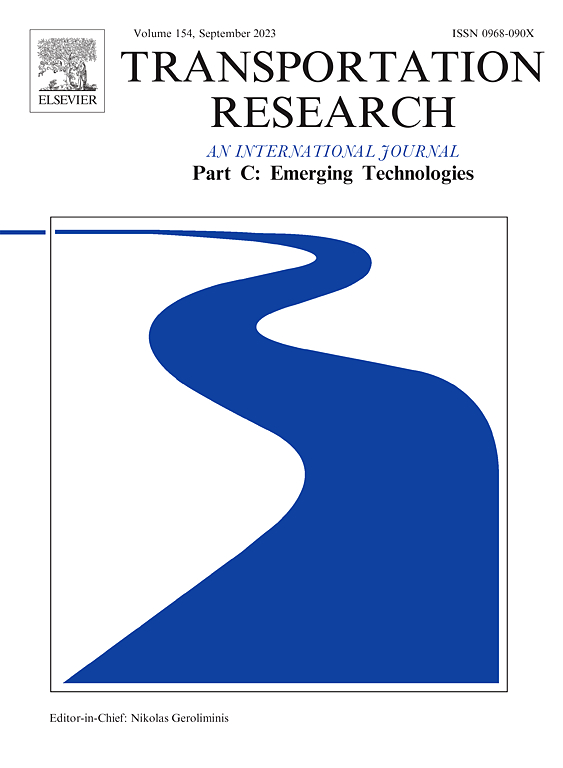Towards an efficient electric bus system: Multi-phase optimization model for incremental electrification of bus network with uncertain energy consumption
IF 7.6
1区 工程技术
Q1 TRANSPORTATION SCIENCE & TECHNOLOGY
Transportation Research Part C-Emerging Technologies
Pub Date : 2025-02-27
DOI:10.1016/j.trc.2025.105011
引用次数: 0
Abstract
Electrifying bus transit systems emerges as a practical solution to environmental degradation resulting from the unprecedented level of mobility nowadays. In the U.S., with the intensified efforts to expand EV infrastructure, a special emphasis is now placed on providing emission-free transit services. This initiative is central to America’s push towards a net-zero-emissions future. In response, a growing number of cities have started replacing diesel buses with battery electric buses (BEBs). However, technological, operational, and economic barriers related to charging infrastructure and power supplies make the electrification of bus systems a gradual process, where only a part of the system is electrified at each stage. Moreover, due to the limited battery capacities of BEBs and their stochastic discharge rates influenced by factors like weather, traffic, and road conditions, BEBs often require daytime charging to be able to continue operating throughout the day. Therefore, transit agencies need to develop an integrated strategy that can address various costs of electrification and minimize the planning and operational costs. This study proposes a framework to facilitate the incremental electrification of bus systems. We formulate the problem as a two-stage stochastic mixed-integer linear programming model. The first stage optimizes long-term strategical decisions related to fleet sizing, charging station siting, and charging-station-route assignments under random BEB charging demand and time-of-use electricity tariffs. The second-stage optimizes the charging operations of the BEB fleet for a realized charging demand scenario while maintaining the service schedule for passenger convenience. We also develop a Benders decomposition method to solve the problem with better computational efficiency than existing solvers. To validate the proposed model, we test it on a real-world bus network to design an incremental electrification plan. We show the efficacy of the solution approach and study the managerial insights including the deployment of fast charging and potential battery technology enhancement in the future.
求助全文
约1分钟内获得全文
求助全文
来源期刊
CiteScore
15.80
自引率
12.00%
发文量
332
审稿时长
64 days
期刊介绍:
Transportation Research: Part C (TR_C) is dedicated to showcasing high-quality, scholarly research that delves into the development, applications, and implications of transportation systems and emerging technologies. Our focus lies not solely on individual technologies, but rather on their broader implications for the planning, design, operation, control, maintenance, and rehabilitation of transportation systems, services, and components. In essence, the intellectual core of the journal revolves around the transportation aspect rather than the technology itself. We actively encourage the integration of quantitative methods from diverse fields such as operations research, control systems, complex networks, computer science, and artificial intelligence. Join us in exploring the intersection of transportation systems and emerging technologies to drive innovation and progress in the field.

 求助内容:
求助内容: 应助结果提醒方式:
应助结果提醒方式:


